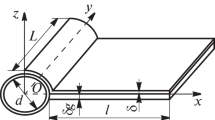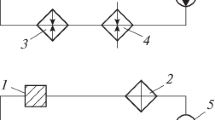Abstract
A radiator with a two-layer hybrid structure is proposed for thermal control systems in spacecraft. Mathematical modeling confirms the efficiency of the emitting surface. On that basis, without loss of reliability, the heat pipes may be eliminated, and consequently the radiator mass is significantly decreased.



Similar content being viewed by others
REFERENCES
Kudryavtseva, N.S., Osnovy proektirovaniya effektivnykh sistem termo-regulirovaniya kosmicheskikh apparatov (Fundamentals of Design of Effective Thermal Control Systems for Spacecrafts), Moscow: Mosk. Aviats. Inst., 2012.
Malozemov, V.V., Kudriavtseva, N.S., and Alekseev, V.A., Joint Optimization of the Thermal Control System and Cooled Instruments Characteristics: SAE Technical Paper 941376, Warrendale, PA, 1994.
Malozemov, V.V. and Kudryavtseva, N.S., Joint optimization of the mass-energy characteristics of the thermal control system of spacecrafts and the instrumental complex to ensure the required reliability, Vestn. Mosk. Aviats. Inst., 2009, vol. 16, no. 1, pp. 5–14.
Belyavskii, A.E., Novikov, S.V., Sorokin, A.E., and Shangin, I.A., Thermal stores in spacecraft heating systems, Russ. Eng. Res., 2019, vol. 39, no. 6, pp. 507–509.
Zaletaev, V.M., Kapinos, Yu.V., and Surguchev, O.V., Raschet teploobmena kosmicheskogo apparata (Calculation of Heat Transfer of a Spacecraft), Moscow: Mashinostroenie, 1979.
Novikov, S.V., Problems of the Russian economy integration in the sphere of high-tech global space, TEM J., 2019, vol. 8, no. 1, pp. 207–210.
Basov, A.A., Prokhorov, Yu.M., and Surguchev, O.V., Heat pipe radiators in spacecraft thermal control systems, Izv. Ross. Akad. Nauk, Energ., 2011, no. 3, pp. 37–41.
Schlitt, R., Bodendieck, F., Boldt, P., et al., First steps in the development of high thermal conductivity hybrid structures (HiDuct), Proc. 50th Int. Conf. on Environmental Systems (ICES-2020-4), Lisbon, 2020.
Dmitriev, O.N. and Novikov, S.V., Economic assessment of federal scientific programs, Russ. Eng. Res., 2018, vol. 38, no. 4, pp. 326–329.
Rapilbekova, N.S., Thermophysical properties of a thin-layered medium, Vestn. Samar. Gos. Aerokosm. Univ., 2013, no. 2 (40), pp. 127–131.
Snarskii, A.A., Pal’ti, A.M., and Ashcheulov, A.A., Anisotropic thermocouples, Semiconductors, 1997, vol. 31, no. 11, pp. 1101–1117.
Sorokin, A.E., Bulychev, S.N., and Gorbachev, S.I., Environmental impact of polymer composites, Russ. Eng. Res., 2021, vol. 41, no. 1, pp. 53–55.
Zagovorchev, V.A. and Tushavina, O.V., The use of jet penetrators for movement in the lunar soil, INCAS Bull., 2019, vol. 11, pp. 121–130.
Belyavskii, A.E., Heat stores with a melting working medium for spacecraft thermal control systems: simulation, Russ. Eng. Res., 2020, vol. 40, no. 12, pp. 1135–1137.
Belyavskii, A.E., Heat stores with a melting working medium for spacecraft thermal control systems, Russ. Eng. Res., 2021, vol. 41, no. 1, pp. 56–57.
Author information
Authors and Affiliations
Corresponding authors
Additional information
Translated by B. Gilbert
About this article
Cite this article
Belyavskii, A.E., Kudryavtseva, N.S. & Sorokin, A.E. Hybrid Radiator for Spacecraft Thermal Control Systems. Russ. Engin. Res. 42, 57–59 (2022). https://doi.org/10.3103/S1068798X22010038
Received:
Revised:
Accepted:
Published:
Issue Date:
DOI: https://doi.org/10.3103/S1068798X22010038




